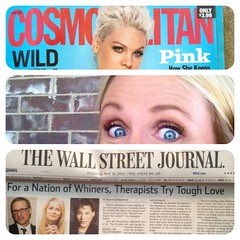What do you think of when you think of professional networking? Private practice therapists who I've worked with in business consultations usually consider networking to be meeting with other like-minded professionals for lunch or handing out business cards to physicians offices.
While those are important ways to make connections that build your therapy practice, there are other ways to get the word to thousands and thousands of people in one shot, instead of just a few folks at a time. Rarely do shrinks think of networking with reporters.
Over the last few years I've focused on responding to reporter queries seeking quotes from experts on a variety of mental or emotional health issues, and family relationship advice. There are a few who now contact me for quotes when they are pitching new articles or stories. I've had a great time corresponding with them by email or talking by phone.
This month I am thrilled to have quotes in:
Cosmopolitan Magazine (June 2012) article "Are we boring"
Wall Street Journal (today May 15, 2012) "For a nation of whiners, therapist try tough love" (with a photo included)
Click here to see quotes in other national publications
Tips for interviewing with reporters and journalists:
1) Seek out opportunities
Keep an eye out for opportunities to interview with local and national reporters. Sign up for services that notify you of reporters looking for interviews, like Reporter Connection, ProfNet Connection, Expert Engine.
2) Respond to requests ASAP
I've come to realize that journalistic deadlines are incredibly tight, and the sooner I respond, the better. I've interviewed one afternoon for an E! Online article and it posted that evening. When I get an email request for an interview I will respond right then on my smart phone with comments off the top of my head. I've been known to pull over on the side of the road while driving carpool to respond to an interview request.
3) Avoid psychobabble
Interviewing with the popular media is different than talking with colleagues. Fellow shrinks can talk in short hand with acronyms like DBT, CBT and EFT; we know what transference and countertransference are, but most people don't know and don't care. Always use layman's terms that can be easily understood even if someone's never taken Psychology 101.
4) Give quotable sound bytes
In the therapy office, we are used to taking our time, starting where the client is, and exploring client's deeper emotions. Media interviews require doing the opposite of what you do in therapy. In media interviews you have to get right to the point. Most journalists are looking for a few engaging and relevant sentences to support their piece, not a dissertation.
5) Let your passion show
I think part of why I've been successful in getting quoted in national publications is because I show my passion for the work and for the topic of the story or article. Even in email correspondence, don't be afraid to show your personality and be approachable. I also openly share my gratitude for the interview opportunity and how much I enjoy media interviews.
6) Make your contact info easy to find
Make sure that your name and credentials (the way you'd like them to appear if you're quoted), your email address, and your cell phone number are easy to find in any correspondence. Reporters don't have time to hunt you down.
7) Ask them to contact you again
At the end of each interview or correspondence, whether you interview or not, be sure to ask them to keep you in mind as a resource in the future. Ask them to keep your contact information should they need your expertise in the future.


As healers, we genuinely like to do our work. Guiding clients through the therapy process and seeing them make progress is why we do what we do. But if you're in private practice, you know there's a lot going on in the back end and that it's crucial to run an efficient and organized business.